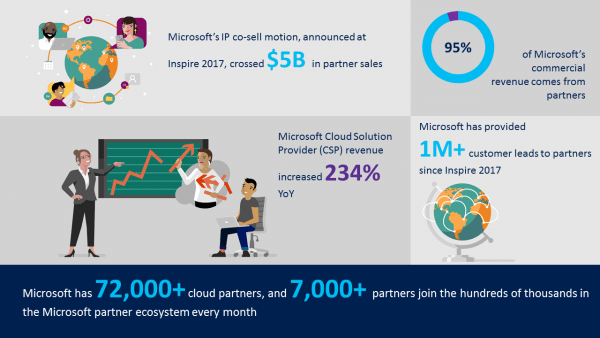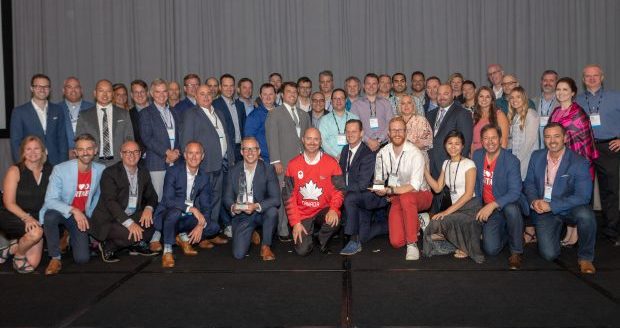Five years ago, Microsoft Corp.’s channel chief for Canada would have had a hard time believing that their partner community was helping build smart farms or park management solutions that scanned bears’ faces.
But today, that’s just the norm, said Jason Brommet.
“The types of business and business models that are being created are significantly different than they were two years ago,” said Brommet, referring to the Canadian market. “AI has been a big driver of that.”
Microsoft acknowledged this at its annual Inspire event in Las Vegas yesterday, where the company’s internal sales teams and extended partners gathered together – for the first time under one roof – to find out what the sales strategy looks like for the year ahead.
During a briefing with reporters prior to the event, Gavriella Schuster, corporate vice-president for One Commercial Partner, said more than 7,000 partners enter the Microsoft ecosystem every month, double the rate from two years ago. She wants to see that number grow.
“We want to partner with all types of companies, large and small, and be the launch pad for growth for every company,” said Schuster.
Azure and AI
To make that happen, Microsoft is counting on Azure’s continued growth – the cloud service grew by 93 per cent in the company’s third quarter last year – while helping partners make it even easier to sell the service to customers, who as previously mentioned, now come in various shapes and sizes, representing a multitude of verticals. Partners will also notice Microsoft’s partner-first One Commercial Partner organization receive ongoing support, said Schuster. The Microsoft subsidiary, focused on developing the partner community that considers all partner types regardless of size and expertise, launched last year at Inspire.
Revenue from Microsoft’s Cloud Solution Provider (CSP) licensing model, introduced four years ago, jumped by 234 per cent year-over-year. It’s the company’s strongest licensing model ever, according to Schuster, and a service that is going to receive additional support to complement Azure’s success.
“We’re going to grow CSP and add capabilities to have that single contract with a partner,” explained Schuster, pointing to the inclusion of Microsoft Azure Reserved Virtual Machine Instances (RI) and Server Subscriptions in CSP, as an example.
Schuster described the current boom in the cloud market as the modern-day gold rush, but suggested data is the currency, and that AI is what will help partners and customers get the best haul.

Courtesy Microsoft.
Kevin Crowe, executive vice-president for Long View Systems Corp., said 80 per cent of his clients use AI to improve operational efficiencies. More recently, however, 20 per cent of them are using it to solve other customers’ specific business challenges and bring “differentiating” solutions to market.
“AI is a major focus for us and a building block for our 2019 strategy,” he said. “We have proof of concepts on the go that are trying to deliver predictive analytics and dashboards for our clients. I think we have approximately 20 to 30 of these projects on the go that involve AI. We have to keep investing in this and move it forward. Just like cloud, let’s say about four to five years ago, there was a lot of debate about how much it was going to be used and adopted. We think AI is in the same situation right now, and in the next year or two, it’s going to become a massive disruptor.”
Microsoft’s partner portal website has also undergone some tweaks to make it easier for users to identify exactly the kind of partner they’re looking for. It comes back to the fact that organizations approaching Microsoft today are no longer just the traditional enterprise companies, explained Brommet.
“We’re simplifying that front-door entrance to Microsoft. And the changes you see in the portal are, for the first time, inclusive of our consumer channels as well.”
Azure Expert MSPs
Microsoft is also touting the introduction of Azure Expert MSPs, a new certification program for partners working with Azure.
Partners looking to get certified have to complete an audit by an independent third party and provide multiple customer references of Azure managed services projects delivered in the last 12 months. Additionally, partners have to have DevOps capabilities that prove they can continue to innovate on the service.
“To retain the badge, these expert partners need to continue to meet prerequisites annually and complete a progress audit every year,” said Schuster.
The new program is great news for partners and clients, according to Crowe.
“We’ve been working with Azure for a while and we’d love to raise the standard there. If you have certain parties that can’t deliver a strong managed service that’s not going to help the client ecosystem,” he said, adding Long View is in the midst of completing the audit process. It expects to be completed by Christmas.
The U.S. market has been more aggressive in its adoption of cloud and AI, said Crowe, but Canada’s cautious approach shouldn’t be mistaken for a lack of ambition or creativity.
“We’re seeing digital transformation really accelerating in British Columbia and Ontario,” he explained, while pointing to the oil and gas sector, which has furiously been trying to find operational efficiencies through new technologies after oil prices plummeted in 2015.
Crowe likens today’s technology community in Canada to the early days of the internet.
“There was such an incredible buzz back then, and the level of creativity and innovation going into IT back then was incredible. A few years ago we didn’t have that same level of buzz. But it’s back now.”






